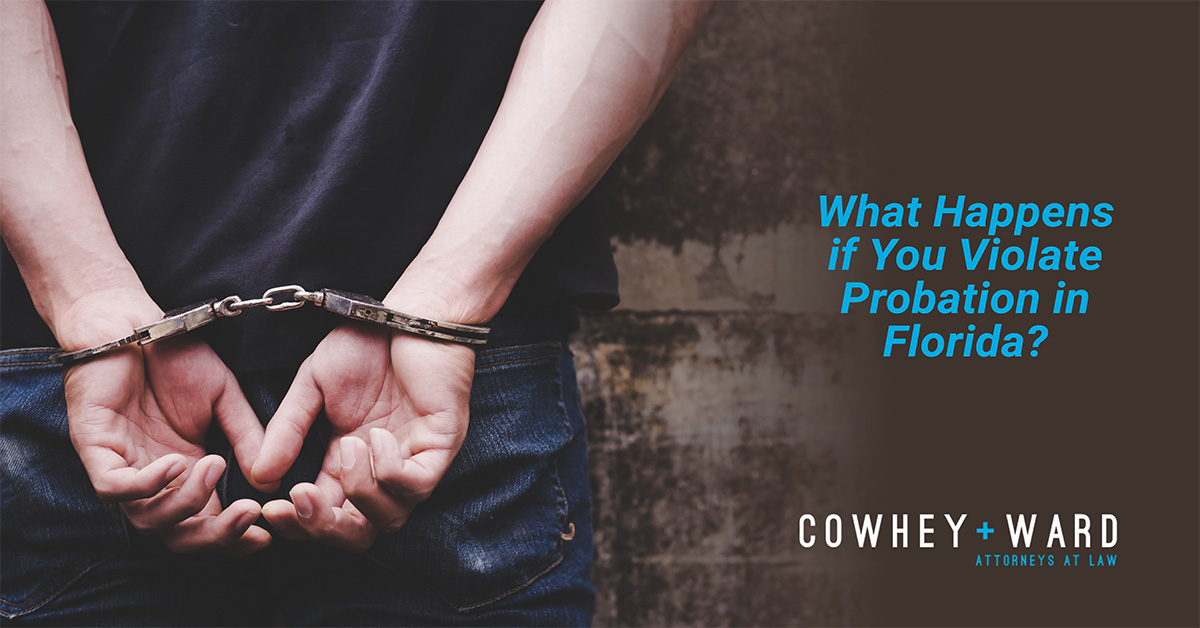What Happens if You Violate Probation in Florida?

If a Florida judge has sentenced you to probation, you should probably be grateful. It certainly beats the alternative sentencing of up to two years in county jail for a misdemeanor conviction or one year to life imprisonment in a state or federal penitentiary for a felony. While you may have dodged the proverbial bullet with probation, always keep in mind that, until its term expires, the alternative sentencing hangs over your head like the Sword of Damocles.
With extensive experience helping clients strategize effective defenses against criminal charges, the criminal defense lawyers of Tallahassee’s Cowhey + Ward Attorneys at Law also defend clients accused of violating their probation. They advise clients that worst-case violations of probation penalties lead to its revocation and reinstatement of the original sentence that the probation replaced. However, judges have wide discretion in how they penalize probation violators, and working with a skilled criminal defense attorney can help accused violators maintain their probationary status or mitigate the penalties for violating it. Read on to learn more about probation and what happens if you violate it.
Probation Under Florida Law
Florida law allows judges to sentence convicted offenders to probation instead of imprisonment or after serving part of their sentence. This enables offenders to remain in their communities provided they adhere to the terms of their probation, which usually includes regular check-ins with a probation officer. Some probation conditions are mandatory, but judges have wide discretion to modify them and to impose additional terms. Probation conditions outlined in Section 948.03 of the Florida Statutes include:
- Reporting to the probation officer as directed by the judge and/or probation office.
- Not violating any laws.
- Maintaining employment (or making a concerted effort to find a job).
- Paying court-ordered fines, court costs, and restitution.
- Performing court-ordered community service.
- Refraining from using or possessing illegal drugs.
- Not associating with known criminals.
- Prohibitions on owning, using, or possessing firearms.
- Submitting to random drug and/or alcohol testing.
- Allowing probation officer visits to the home, workplace, and other relevant locations.
- Paying monthly state probation supervision fees.
- Travel restrictions.
Judges tailor probation conditions and duration based on the severity of the criminal offense and the known status of the offender (any previous arrests, gainfully employed, etc.). The terms of felony probation are generally far stricter, with greater supervision than misdemeanor probation. Judges typically mandate that felony probationers attend stringent rehabilitation programs covering substance abuse, anger management, and sex offender treatment, as warranted.
On average, probation sentences range from two to eight years, and about 141,000 Floridians were on probation as of 2023, according to the Florida Department of Corrections. And those offenders pay for the privilege of being on probation, as the state-mandated monthly supervision fee for probation is $50, plus any county surcharges.
How Do Courts Address Probation Violations in Florida?
When a probation officer finds out or believes that an offender under their supervision has violated probation terms, they file an Affidavit of Violation to the court. This affidavit includes a detailed description of the alleged violation and any supporting evidence. After careful review, a judge will determine whether they believe the violation occurred. If so, they will issue an arrest warrant for the offender. Once arrested, the offender’s ability to gain release on bond until the hearing depends on the violation’s severity.
Violation of probation (VOP) hearings differ from trials and other criminal hearings. There is no right to a jury, but offenders can have legal representation. The standard for proving guilt is lower than for trials, as the state only must prove it by a “preponderance of evidence” rather than “beyond a reasonable doubt.” Furthermore, hearsay is allowed, unlike trials, and a probation officer’s beliefs about the violation are accepted as evidence.
Judges have three options in making their rulings in VOPs:
- Reinstate the initial probation.
- Modify the probation, usually with more stringent conditions.
- Revoke probation and impose the alternative jail or prison sentence.
Defending Against VOP Claims During the Hearing
In ruling, a judge considers the affidavit and the testimony of the probation officer and any other witnesses. They also consider whatever evidence the offender can present, such as documents or witnesses, that can refute the VOP claims.
While a judge may show leniency in VOP cases involving minor accidental or errors of judgment violations, they have vast discretion to rule however they want. Thus, it’s imperative that anyone facing a VOP hearing secure legal representation from a skilled criminal defense attorney. They can investigate the details of the alleged violation and strategize the most effective defensive response.
Consult with Cowhey + Ward for Your VOP Defense in Tallahassee
If you or a loved one is facing a VOP hearing in Tallahassee, don’t attend it without legal representation. The criminal lawyers at Cowhey + Ward have proven success in helping clients secure favorable outcomes in VOP hearings. To learn how Cowhey + Ward can help you strategize an effective defense for any criminal matters, contact our Tallahassee-based office today at (850) 222-1000.
Accessibility Statement
Our firm is committed to keeping our site accessible to everyone. We welcome feedback on ways to improve the site’s accessibility.
